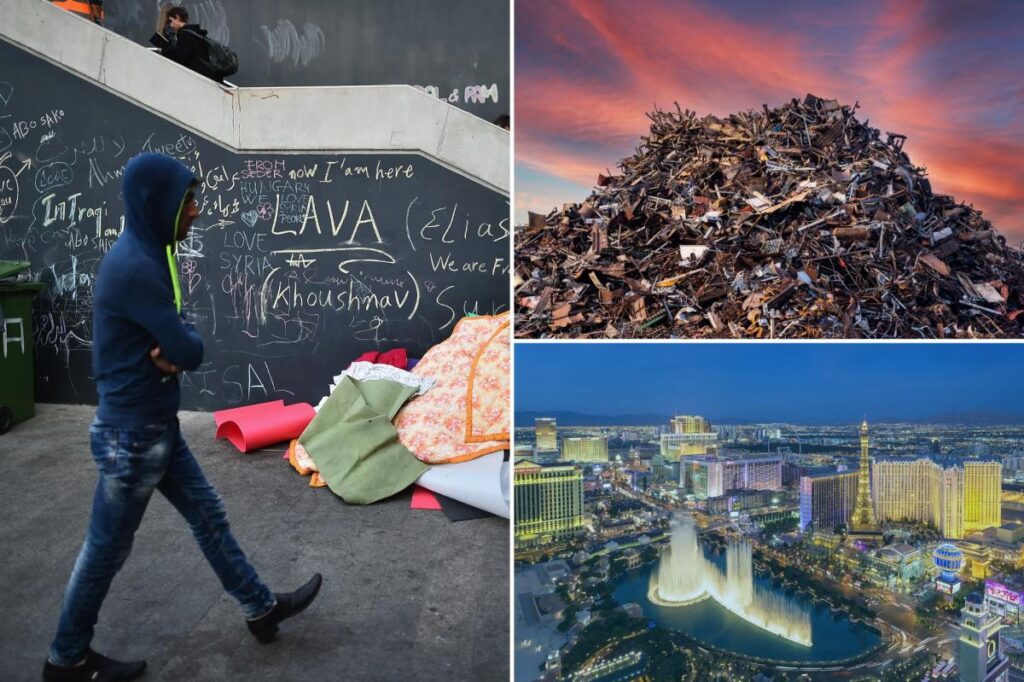Their grime rates are skyrocketing.
Those who want to enjoy clean living might want to avoid Budapest, Hungary, which was recently named the world’s dirtiest city by global luggage storage firm Radical Storage.
Meanwhile, Italy boasted a staggering four cities in the top ten — Rome, Florence, Milan and Verona — bringing new meaning to getting mud on one’s Boot.
Stateside, Las Vegas placed third in the urban filthiness rankings while rat haven New York City came in 12th, suggesting that our new nickname should be the City That Never Sweeps.
To dig up the dirt on these grubby hubs, the Radical Storage selected 100 cities from Euromonitor’s Top 100 City Destinations Index and analyzed the Google reviews of each destination’s top 10 attractions.
The muck-raker perused 70,000 real online reviews from the past year, spotlighting terms like “clean” and “dirty” to gauge which cities were praised for their hygiene and vice versa.
This rubric was used to air the metropolises’ dirty laundry and assign each urban center a cleanliness score based on the percentage of negative reviews related to their soot levels.
To ensure accuracy, Radical Storage excluded cities with fewer than 100 total reviews, removed false positives and negatives such as “not clean” and “not dirty,” and only included English reviews.
Sitting atop the proverbial garbage heap was Budapest, Hungary, with “more than 37.9% of cleanliness-related reviews describing dirt or poor upkeep,” per Radical Storage.
The site chalked up this city’s soot levels to the city’s waste management sector struggling to keep pace with the tsunami of tourists. They pointed out that Hungary’s tourism industry increased 8.3% in September, with “Budapest alone recording a 12% jump from the same month in 2024.”
Rome proved that one man’s treasure is another’s trash heap. The Eternal City was toward the bottom of the ladder when it came to perceptions of cleanliness, with 35.7% of reviews mentioning dirt.
There are whole Reddit threads dedicated to the Italian capitals’ grime rates. “I’m visiting Rome (from Ireland) for the 3rd time in 20 years,” griped one appalled visitor. “From what I’ve seen, it has always been filthy.”
They added, “Rome is a truly beautiful city, but the rubbish problem is utterly disgusting.”
Included was a photo of a landfill-esque pile of garbage in the city. In fact, the mounting garbage problem has gotten so bad that it’s attracted hordes of wild boars looking to pig out on easy pickings.
What happens in Vegas doesn’t stay in Vegas — at least when it comes to their soot-nami.
The City of Sin was the third dirtiest destination with 31% of cleanliness-related reviews being negative — an issue they chalked up to high tourist traffic.
“Given its 24-hour nightlife and enormous visitor turnover, it’s perhaps unsurprising that maintaining spotless streets is a challenge,” Radical Storage wrote. “The city also isn’t ignorant of the issues with initiatives such as Pick It Up Las Vegas running to clean up storm drains, tunnels, streets and parks.”
The gambling mecca’s grubbiness was ripped online as well.
One TripAdvisor reviewer derided Las Vegas as a dangerous “dump” with “feces and urine everywhere, dope smoking in every building and [on] every street” and homeless people hassling visitors for money.
Rounding out the top five in this dirty dozen-or-so were Florence and Paris.
The top ten dirtiest cities in the world
- Budapest, Hungary (37.9% of cleanliness-related reviews were negative)
- Rome, Italy (35.7%)
- Las Vegas, US (35.7%)
- Florence, Italy (29.6%)
- Paris, France 28.2%)
- Milan, Italy (26.8%)
- Verona, Italy (26.2%)
- Frankfurt, Germany (24.6%)
- Brussels, Belgium (24.4%)
- Cairo, Egypt (23.6%)
Fortunately, globetrotters don’t have to navigate a muck minefield when traveling abroad. Radical Storage named the cleanest cities in the world as well.
The top ten cleanest cities in the world
- Krakow, Poland (98.5% of cleanliness-related reviews used positive language)
- Sharjah, United Arab Emirates (98%)
- Singapore (97.9%)
- Warsaw, Poland (97.8%)
- Doha, Qatar (97.4%)
- Riyadh, Saudi Arabia (96.9%)
- Prague, Czech Republic (96.4%)
- Muscat, Oman (96.4%)
- Dubai, United Arab Emirates (96.3%)
- Fukuoka, Japan (96.3%)
Read the full article here

